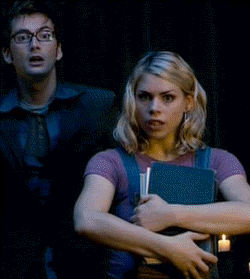I've been thinking about Who as a postmodern product (aswell as a product of the postmodern). As television enters its new age (enters? heck, most people I know are already there!) I am becoming anxious about our desires for the latest t.v tech, and also what this latest tech 'means'. I wish I could say this was in no related to my own frustrated consumerist desires (translation: 'worrying about not being able to buy/keep up with it'). In many ways this would be less of a problem if I hadn't a) read Baudrillard and b) actually seen HD (a friend has it and boy was I drooling).
HD promises 'realer' images. The images are certainly sharper, clearer etc. About the hyperreal conundrum of the 'real' fake image we need not elaborate. Two things: one, this is how new tv tech has always been marketed (marketed itself?). Mark Gatiss wittily alluded to this in 'The Idiot's lantern', with the family gathered round the primitive set (grainy, convex, and not so much black and white as black and blue) and the granny saying "look at the picture, it's so clear!". Cinemascope (okay, that's film but the tech is the same) was hyped with "you can see it without glasses!". Which brings me to my second point: I do wear glasses. In order for me to fully make out a precise image, I have to process the image through another piece of technology, through yet another lens. How do I know what I am seeing is what everyone else is seeing, or what I'm 'supposed' to see? (how does anyone?)

In many ways Who can be seen as contributing to 'the death of history', as the value signifiers of history are meaningless in our hyperreal world of mix'n'match, streaming, referencing and cultural recycling. Best example? Lawrence Miles' mediations on the ahistoricism of the New Series' historicals - the way characters from history are used as characters of fiction, with no thought given as to shoiwng us 'why' these people were so great, or so clever. (his view of Moffat's Madame dePompadour as a virtual blow-up doll may seem offensive, but only because it is so horribly on the button) Second best example is Agatha Chrsitie's reaction to Donna telling her about films in 'The Unicorn and the Wasp': "Moving pictures?" ... as if somebody from 1926 would have no idea what films were. It's because we, and Who, live in the hyperreal age, where history (which no longer exists as anything other than travelogue or referrant for fundamentalists) is meaningless - Agatha doesn't know what films are, because she's from olden days, and in olden days they didn't have things that we have now.
(third best example is the kids from 'Totally Doctor Who' decorating a 1910 studio set with a picture of Churchill circa 1945, and not being remotely embarrassed)
Who presents us with fictional images, but it also employs the use of 'real' fiction, i.e. tv news. In an obvious way this is merely a clear budget-saving device. It's far easier to have a fake CNN reporter tell us that the entirety of America has been transformed into Adipose than it is to show it. However, in other ways it is done not as budget-saving device but to reinforce the illusion of reality (a loaded term!) .. e.g. the 'Ghostwatch' weather report. In classic Who, erzatz tv reports were used in order to get the audience to question the veracity of media, and media reporting - the pieces to camera of the reporter in 'The Daemons' contrast with the way the reporter is mocked by the archaeologists off-camera, and the reporter in 'The Web of Fear' is clearly shown to be a smug imbecile, trying to twist people's words into fitting his story. Modern Who is much less questioning of the media - 'The Long Game' stands as its most significant contribution to postmodern critique, but had a lot of its bite removed when placed in the context of it being just a big old plan orchestrated by the Daleks.
So... given all of the above I know I should be much more resistant to the medium of tv than I am. Who may be a tv show, but it's much more than just a tv show, it's an idea. This is why its obvious love for/embracing of tv is so... strange. It used to be a very bookish programme, but -as has also been noted in fandom- books are mere fetish objects in postmodern Who, reference points to the old age, things that are held in libraries just waiting to be scanned for clues (c.f. 'Tooth and Claw') rather than read for personal enjoyment or learning for learning for learning's sake.
I know I'm a stick in the mud (despite my drooling over Blu-Ray), but maybe being a stick in the mud is better than forcing myself to go with the flow and surrendering my literacy and intellect totally. For the time being at least....

1 comment:
> As television enters its new age
Which? Obsolescence? :)
Good article though.
Post a Comment